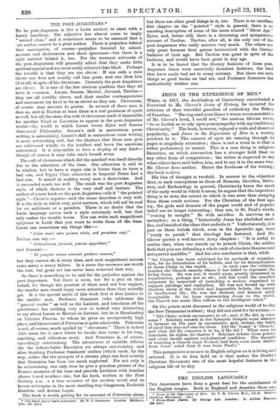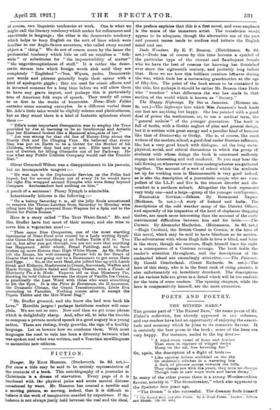THE ENGLISH LANGUAGE.?
Tux Americans have done a great deal for the enrichment of the English tongue. Both in England and America there are,
• Jams in the &valence of Men. By T. B. Glover. MA., LL.D. Student Christian Movement. [Cs.] Rome-Made Fables. By George Ade. London : C. Arthur Pearson. (CL net.]
of course, two linguistic tendencies at work. One in what we might call the literary tendency which makes for refinement and exactitude in language ; the other is the democratic tendency which helps to keep English on the sort of lines which were familiar to our Anglo-Saxon ancestors, who called every second object a " thing." We do not of course mean by the latter the professorial tendency which bids us call an omnibus a " folk- wain " or substitutes for " the impenetrability of matter" " the ungetthroughishness of stuff." It is rather the demo- cratic) stream into which foreign words sink until they are
completely " Englished "—'bus, Wipers, padre. Democratic new words and phrases generally begin their career with a kind of apologetic giggle ; they are used for comic effects and in inverted commas for a long time before we will allow them to have any grave import, and perhaps this is particularly trae of American folk ways of speech. They nearly all come to us first in the works of humorists. Home-Made Fables contains some amusing examples. In a different verbal dress Mr. Ade's little tales would be slightly solemn and platitudinous, but as they stand there is a kind of fantastic splendour about
them :- " Effie's mast important Occupation was to employ the Time provided by Joe in learning to be so Intellectual and Artistic that her Husband looked like a Mackerel alongside of her."
" Joe was strong for that old line of Honey-Drip about the Sturdy Oak and the Clinging Vine. He believed that every Man was put on Earth to be a Getter for the Mother of his Children, whether they had any or not. Effie used him as a sort of Derrick for lifting Obstacles out of her Pathway. He was what any Public Utilities Company would call the Trouble Man."
Oliver Cromwell Wilton was a disappointment to his parents, but an incomparable tangoist :- " He was not in the Diplomatic Service, as the Folks had hoped, but for several Hours out of every 24 he would have the right Fin wrapped around Nymphs who were flossy beyond Compare. Ambassadors had nothing on him."
A peach of a sentence! Flossy Nymph is admirable. Intentionally hideous is the following :- " On a balmy Saturday P. se, all the jolly Souls accustomed to remove the Throat-Latches from Saturday to Monday were piling into the high-powered Buzz-Wagons for a Spin out to the Home for Polite Souses."
Here is a story called " The Taut Waist-Band." Mr. and Mrs. Stuffer have lost most of their money, and she tries to
serve him a vegetarian meal :-
"Then came Rice Croquettes, one of the most startling Specimens of Near-Food ever touted by a Lady writing Syndi- cate Come-Ons and boarding at an Italian Table d'HAe. You eat it, but after you get through you are not sure that anything has Happened. After which, Bread Pudding, said to have broken up more Homes than High White Shoes. As Mr. Stuffer left the House, his well-meaning Partner felt in her Heart of Hearts that he was going out to a Restaurant to get some Ham and Eggs.. . . So, at the next Meal, she jollied him up with Lamb Steak and Kidneys, Mushrooms in Cream, Succotash, Waffles and Maple Syrup, Endive Salad and Sharp Cheese, with a Finale of Blueberry Pie d la Mode. Experts tell us that Blueberry Pie, showing its bold Colour between the slopes of Vanilla Ice Cream, is practically the Last Word with those who want something to hit the Spot. It is the PQcs de Resistance, the anouernent, the Dramatic Climax, the Grand Transformation, Little Eva ascending to Paradise. Nothing comes after it except the Pepsin Tablet and the Hot-Water Bag."
" Mr. Stuffer groaned, and she knew she had won back his
Love." Horrible jargon ! perhaps fastidious readers will com- plain. We are not so sure. Now and then we get some phrase which is delightfully sharp. And, after all, to take the trouble to compose a private mode of speech is a good augury in a young nation. These are rioting, lively growths, the sign of a healthy language. Let us beware how we condemn them. With most languages the road to ruin has been a diversity between what was spoken and what was written, and a Venetian unwillingness to naturalize new oitizena.



































 Previous page
Previous page